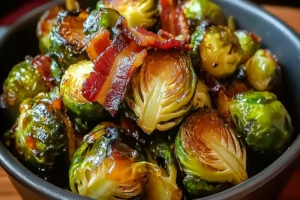Introduction
Finding healthy protein sources can often be tough; however, turkey sausage might be the perfect answer. Not only is it lean, but it is also full of flavor, making it ideal for a variety of meals.
Initially, I used to think sausage was reserved for unhealthy foods. However, turkey sausage completely changed my perspective. In addition to being low in calories and fat, it is an excellent option for health-conscious eaters looking for a nutritious and delicious alternative.
Table of contents
Understanding Turkey Sausage Basics
Turkey sausage is a leaner choice compared to traditional pork sausage. Not only does it offer a unique taste, but it is also a healthier option. Therefore, it has become a popular alternative for those seeking to improve their diets. Let’s now explore what makes turkey special, how it’s made, and the different types available.
Key Components and Ingredients
The main ingredient in sausage is, of course, turkey meat. Typically, this mix includes turkey breast and ground turkey to achieve a lean yet moist texture. Furthermore, other ingredients such as water, salt, and spices are added to enhance its flavor and texture, ensuring a satisfying taste experience.
Manufacturing Process Overview
The process of making turkey sausage begins with grinding the turkey meat to the desired consistency. Afterward, it is mixed with seasonings and preservatives to ensure both flavor and longevity. Additionally, the mixture is stuffed into casings to provide a uniform taste and texture. Notably, casings made from collagen help maintain the sausage’s shape during cooking, which is essential for presentation and convenience.
Types of Turkey Sausage Products
Turkey is available in many forms, including breakfast links and Italian-style sausages. Each type has its own distinct flavor profile. As a result, it is easy to find a variety that fits both your taste preferences and dietary needs. For example, breakfast links are ideal for a quick morning meal, while Italian-style sausages work well in pasta dishes or casseroles.
In conclusion, sausage stands out as a versatile and healthier alternative to traditional options. Understanding its components, production process, and available types makes it easier to incorporate this lean protein into your meals with confidence.

Looking for a leaner protein for breakfast or a flavorful addition to your meals? Turkey sausage is a great choice. Knowing the basics helps you use it in your cooking with confidence.
Nutritional Profile and Health Benefits
Turkey is a lean and tasty protein that’s good for you. It has 23.9 grams of protein per 100 grams. This makes it a great choice for those watching their diet.
It has fewer calories and fats than regular pork sausages. This is why it’s popular among people who care about their health.
Turkey sausage is also packed with B vitamins. It has lots of niacin and vitamin B12. These vitamins help your body make energy, keep your brain sharp, and make red blood cells.
It’s also a good source of zinc. Zinc helps your immune system and keeps you healthy.
The saturated fat in sausage is lower. This might help your heart stay healthy. Eating turkey instead of red meat could lower heart disease risk by 19%.

"Including turkey in the diet may benefit heart health due to its low fat, high protein content, and various micronutrients."
Eating turkey sausage can add lean protein and important nutrients to your meals. It’s a tasty way to support your health and well-being.
Turkey Sausage vs. Traditional Pork Sausage
More people are looking for leaner protein options. As a result, there has been an ongoing debate between turkey and pork sausage. While both have tasty flavors, they differ significantly in their nutritional values.
Caloric Content Comparison
To start with, sausage has fewer calories than pork sausage. For example, it contains about 196 calories per 100 grams. In contrast, pork sausage has 396 calories per 100 grams, making turkey the lower-calorie option.
Fat Content Analysis
Furthermore, turkey sausage is lower in fat. Specifically, it has 10.4 grams of fat per 100 grams. Pork sausage, on the other hand, contains 36.2 grams of fat per 100 grams, which is significantly higher.
Protein Value Assessment
In addition to being lower in fat and calories, turkey sausage has more protein than pork sausage. For instance, turkey sausage contains 23.9 grams of protein per 100 grams, whereas pork sausage has only 13.8 grams of protein per 100 grams.
Overall, turkey sausage offers a leaner, higher-protein alternative to pork sausage, making it a preferred choice for health-conscious individuals.
| Nutrient | Turkey Sausage (per 100g) | Pork Sausage (per 100g) |
|---|---|---|
| Calories | 196 | 396 |
| Fat | 10.4g | 36.2g |
| Protein | 23.9g | 13.8g |
The data clearly shows that turkey sausage is a leaner, more protein-rich alternative to traditional pork sausage. It’s a great choice for those looking to improve their nutrition.
Low-Fat Protein Alternative for Health-Conscious Consumers
Turkey sausage is a great choice for those watching their fat intake. Specifically, it contains only 2.27 grams of saturated fat per 100 grams. Therefore, it stands out as a heart-healthy option when compared to traditional pork sausages.
Additionally, turkey is packed with protein, offering between 7 to 11 grams per serving. This makes it an ideal choice not only for individuals trying to lose weight but also for those focused on building muscle.
As the demand for healthier protein options continues to rise, turkey sausage is becoming increasingly popular among health-conscious consumers. For instance, the market size for low-fat sausages has grown significantly, reaching an impressive $3.23 billion in 2024. Moreover, projections suggest it will expand even further, reaching $4.10 billion by 2028. These figures clearly indicate that turkey is a major hit in the food industry.
Furthermore,turkey sausage is incredibly versatile and comes in various forms. You can find breakfast sausages, Italian-style links, and even plant-based alternatives. This variety makes it easy to incorporate turkey into a wide range of meals. In fact, well-known brands such as Applegate, Amylu, Morning Star Farms, Al Fresco, and Trader Joe’s offer a selection of tasty, low-fat options to suit different preferences.
Lastly, the clean eating trend is gaining traction, with more people seeking products that align with their values. Turkey fits perfectly within this trend due to its clean ingredient lists and certifications from trusted sources. As a result, it has become a preferred option for those who prioritize health and sustainability.
Essential Vitamins and Minerals in Turkey Sausage
Turkey sausage is not just tasty and packed with protein. It also has a lot of vitamins and minerals that are good for you. These nutrients help keep you healthy and feeling your best.
B-Vitamin Content
Turkey sausage is known for its B-vitamin content. A small serving gives you a big chunk of your daily niacin (vitamin B3) and vitamin B12. These B vitamins help your body make energy, make red blood cells, and keep your nerves working right.
Mineral Composition
It’s also full of important minerals. A small serving has 20.1% of your daily zinc, which boosts your immune system. It also has 9.2% phosphorus for strong bones and 8.9% copper for healthy red blood cells.
Daily Value Contributions
Adding turkey sausage to your meals can really help. It gives you a lot of the vitamins and minerals you need every day. This makes it a great choice for a healthy and balanced diet.
"Turkey sausage is a lean and flavorful protein choice that can provide a nutritious boost to your meals."
Cooking Methods and Preparation Tips
Adding turkey sausage to your meals can be both tasty and flexible. In fact, you can cook it in many ways to suit your taste and diet. For example, it works well for breakfast, pasta dishes, or soups and stews.
To achieve the best results, try grilling or baking your sausage. Not only do these methods enhance flavor and texture, but they also keep it lean without adding extra fats. When grilling, use tongs to turn the sausages carefully to maintain their juiciness.
Alternatively, pan-frying is another excellent option for stovetop cooking. For instance, heat a skillet with a bit of oil over medium heat. Cook the sausages for 4-5 minutes on each side until they reach an internal temperature of 165°F (74°C).
If you’re looking for recipe ideas, consider adding turkey to breakfast scrambles, frittatas, or even overnight oats. Moreover, it’s a delicious addition to pasta dishes, such as spaghetti or lasagna, and pairs perfectly in soups, stews, and chilis.
Finally, when cooking turkey sausage, always ensure it reaches 165°F (74°C) for food safety. Overall, with its many uses and health benefits, incorporating turkey into your meals can make them both healthier and more flavorful.
Reading Labels and Making Informed Choices
When picking turkey sausage, it’s key to read labels well. Look for products with simple ingredient lists and few additives. Stay away from sausages with long lists of unknown or artificial ingredients.
Check the Nutrition Facts panel for sodium content. Aim for less than 600 milligrams per serving. Also, compare saturated fat levels between brands. Choose those with 4 grams or less per serving for a heart-healthy choice.
Understanding Ingredient Lists
Look at the ingredient list for allergens or gluten-containing items, especially in seasoning mixes. Go for turkey sausage with simple, known seasonings. Avoid those with long or complex ingredient lists.
Nutrition Facts Panel Analysis
- Pay attention to the serving size and adjust your consumption accordingly.
- Prioritize turkey sausage options with lower amounts of saturated fat and sodium.
- Consider the protein content to ensure you’re getting a lean, nutrient-dense protein source.
| Nutrient | Recommendation |
|---|---|
| Sodium | Less than 600 mg per serving |
| Saturated Fat | 4 g or less per serving |
| Protein | Aim for a good source of lean protein |
By carefully reading and understanding labels, you can choose healthy sausage options. These choices should fit your dietary needs and health goals.
Incorporating Turkey Sausage into Meal Planning
Turkey sausage is a great choice for meals all day. It’s lean and packed with protein, perfect for weight control or post-workout. Find out how to add this tasty ingredient to your sausage meals and healthy meal planning.
Breakfast Bliss
Begin your day with a turkey breakfast scramble. Add whole grain toast and sautéed veggies for a full morning meal. It’s also great in breakfast burritos or quiches.
Lunchtime Wraps and Salads
Use sliced turkey sausage in your favorite wraps or salads. It adds protein to keep you full until lunch. Mix it with greens, chickpeas, and a light dressing for a healthy meal.
Dinner Delights
Sausage is fantastic in many dinner dishes. Add it to pasta sauces, stews, or stuffed peppers for extra protein. Grill or sauté it and serve with roasted veggies and grains for a complete meal.
"Turkey sausage is a game-changer in my meal planning. It's so easy to work into breakfast, lunch, or dinner for a healthy, filling option."
Get creative with turkey sausage in your meal planning. Enjoy its sausage meals benefits all day. Its versatility and health benefits make it a great addition to your cooking.
Storage and Food Safety Guidelines
Proper storage and handling are key to enjoying turkey . It’s delicious and nutritious. To keep your sausage safe and tasty, follow these easy steps:
Proper Storage Techniques
For uncooked turkey , store it in the fridge at 40°F (4°C) or below. Use it within 1-2 days. For longer storage, freeze it at 0°F (-18°C) for up to 3 months. Always thaw frozen sausage in the fridge, not at room temperature.
Safety Considerations
- Cook turkey sausage to 165°F (74°C) to kill harmful bacteria.
- Don’t leave cooked sausage at room temperature for more than 2 hours (1 hour if it’s hot).
- Refrigerate leftover cooked sausage within 3-4 days or freeze for longer.
By following these guidelines, you can enjoy turkey safely. This way, you get to savor its great taste and health benefits without worrying about foodborne illness.
Popular Turkey Sausage Brands and Reviews
Turkey sausage comes in many great brands, each offering unique flavors and qualities. For example, Al Fresco All Natural and Amylu are well-known for their quality and taste. Additionally, brands like Bilinski’s and Applegate Organics receive high praise for their healthy ingredients and delicious flavors.
Al Fresco and Amylu
To begin with, Al Fresco’s Spinach & Feta Chicken Sausage is a favorite. Specifically, people love its balanced taste and how the spinach and feta mix with the turkey. Similarly, Amylu’s Cacio e Pepe Chicken Sausages are highly rated. In particular, they are known for their unique Italian-inspired taste and juicy texture.
Aidells
Furthermore, Aidells is another brand that garners a lot of positive feedback. For instance, they offer flavors like Apple & Gouda and Smoked Bacon & Cheddar, which are well-loved by many.
Applegate Organics
In addition, Applegate Organics is popular for using clean, high-quality ingredients in their turkey sausages. This makes them a top choice for health-conscious consumers.
Bilinski’s
Lastly, Bilinski’s offers flavors such as Sundried Tomato & Basil and Spinach Feta. Because of this, these sausages are praised for their flavor and versatility. As a result, they work well in a variety of recipes and meals.
| Brand | Flavor | Price | Review Highlights |
|---|---|---|---|
| Al Fresco | Spinach & Feta Chicken Sausage | $4.99 for 12 oz | Balanced seasoning, spinach and feta complement turkey well |
| Amylu | Cacio e Pepe Chicken Sausages | $8.99 for 9 oz | Unique Italian-inspired taste, juicy texture |
| Aidells | Apple & Gouda, Smoked Bacon & Cheddar | $5.99 for 12 oz | Wide variety of flavorful options |
| Applegate Organics | Various Flavors | Range from $5.99 to $7.99 for 8-12 oz | Commitment to high-quality, clean ingredients |
| Bilinski’s | Sundried Tomato & Basil, Spinach Feta | $5.99 for 12 oz | Innovative flavors, flavorful and satisfying |
These top turkey sausage brands have something for everyone. They offer a variety of flavors for those who want lean protein and versatility. Whether you like classic tastes or something new, there’s a brand and flavor for you.
Recipe Ideas and Serving Suggestions
Turkey sausage is great for many recipes because it’s versatile and flavorful. Whether it’s breakfast, lunch, or dinner, it adds both taste and nutrition to your meals.
For instance, try a turkey breakfast burrito with eggs, bell peppers, and onions. As for lunch, slice it into a hearty lentil soup or use it to top a fresh garden salad.
In the evening, turkey makes a delicious dinner option. For example, you can sauté it with bell peppers and onions to serve over brown rice. Alternatively, stuff it into mushroom caps for a quick and tasty appetizer. Moreover, it pairs perfectly in a healthy grain bowl with quinoa and tahini dressing.
And don’t forget turkey for pizza! Specifically, use it as a flavorful topping to elevate your favorite pizza recipes.
Overall, turkey sausage is a lean protein with a savory taste that makes meals exciting. By experimenting with different cooking methods and flavor combinations, you can discover new favorite recipes featuring turkey sausage.
Understanding Sodium Content and Portions
When you eat turkey sausage, the sodium is something to watch. A 57-gram serving has about 379 milligrams of sodium. This is about 16.5% of what you should have in a day. Remember, eating more than one sausage can really up your sodium intake.
Choosing lower-sodium turkey sausage is a good idea. It helps you keep your sodium levels down. This way, you can still enjoy the taste of turkey without too much sodium. Pairing high-sodium foods with low-sodium ones helps you stay balanced and healthy.
| Sausage Variety | Sodium Content (per 57g serving) | Percentage of Recommended Daily Intake |
|---|---|---|
| Standard Turkey Sausage | 379 mg | 16.5% |
| Lower-Sodium Turkey Sausage | 140 mg | 6.1% |
| Homemade Low-Sodium Sausage | 43 mg | 1.9% |
Being careful with your turkey sodium and portion sizes is key. It lets you enjoy this lean protein while staying healthy. Remember, eating sausage in moderation is important. Choosing lower-sodium options can greatly improve your health.
Dietary Considerations and Restrictions
It’s important to think about dietary restrictions when eating turkey . For example, some sausages might have allergens or gluten in their seasonings. Therefore, always check labels for potential allergens like wheat, soy, or dairy. Fortunately, many brands now offer gluten-free sausage for those with gluten issues.
Allergen Information
Turkey sausage is a good protein choice, but at the same time, knowing about allergens is key. Common allergens in sausage include:
- Wheat or gluten
- Soy
- Dairy
- Nuts
If you want to be cautious, always check the ingredient list and nutritional information on the packaging. This way, you can ensure the sausage is right for your diet.
Special Diet Compatibility
Turkey sausage can fit into various dietary plans, such as low-carb and high-protein diets. However, it’s not suitable for vegetarian or vegan diets because it is made from meat. For this reason, people on special diets should carefully review the nutritional profile and ingredient list. By doing so, they can ensure the sausage meets their dietary needs and preferences.
In summary, consuming a balanced diet that includes a variety of lean protein sources, like turkey , can be a healthy and sustainable way to meet your nutritional needs.
Conclusion
Turkey sausage is a leaner, protein-rich option compared to traditional pork sausages. Not only that, it has fewer calories and less fat. Furthermore, it’s packed with essential nutrients, which means turkey sausage can be a tasty, healthy addition to your meals when eaten in moderation.
When it comes to making the best choice, selecting high-quality sausage brands is key. Additionally, be mindful of sodium content and portion sizes. By doing so, you can fully enjoy turkey sausage’s benefits as part of a healthy lifestyle. Whether it’s grilled, sautéed, or used in your favorite recipes, sausage fits seamlessly into many dishes،with a piece of banana bread guy or any other candy of your own making.
In conclusion, if you’re looking for healthier sausage options, turkey is an excellent choice. With its lean, flavorful, and versatile qualities, it’s perfect for those who want a protein-rich, tasty addition to their diet.
FAQ
What is the nutritional profile of turkey sausage?
Turkey sausage is a lean protein option. It has 112 calories, 13.6 grams of protein, and 5.93 grams of fat per 57-gram serving. It also provides B vitamins and zinc.
How does turkey sausage compare to traditional pork sausage?
Turkey sausage has fewer calories, fat, and sodium than pork sausage. It has more protein and less saturated fat, making it healthier.
What are the key ingredients in turkey sausage?
Turkey sausage includes turkey meat, water, salt, and flavorings. It also has dextrose, smoke flavoring, sodium erythorbate, and sodium nitrite. The turkey meat is ground and mixed with spices and preservatives.
What types of turkey sausage products are available?
You can find different turkey sausage types like breakfast links, Italian-style, and kielbasa. They come in various flavors and can be used in many recipes.
What are the health benefits of consuming turkey sausage?
Turkey sausage is a high-protein, low-fat option. It’s rich in B vitamins, zinc, and other nutrients. Its lower saturated fat may help with heart health compared to pork sausage.
How can turkey sausage be prepared and incorporated into meals?
You can grill, pan-fry, bake, or add turkey sausage to dishes like breakfast scrambles, pasta, soups, and stews. It’s versatile and can be used throughout the day.
What should I look for when selecting turkey sausage products?
Choose turkey sausage with simple ingredients, minimal additives, and low sodium (less than 600mg per serving). Avoid high saturated fat and look for 4 grams or less per serving.
How should turkey sausage be stored and cooked for food safety?
Store uncooked turkey sausage at 40°F (4°C) or below. Use it within 1-2 days. Frozen sausage can last up to 3 months. Cook it to 165°F (74°C) for safety.
Are there any dietary restrictions or allergens to be aware of with turkey sausage?
Some turkey sausages may have allergens like wheat, soy, or dairy. Always check labels for allergens. Turkey sausage is suitable for many diets but not for vegetarians or vegans.
What are some top-rated turkey sausage brands to consider?
Look for brands like Al Fresco All Natural, Amylu, Aidells, Applegate Organics, and Bilinski’s. These brands use quality ingredients and offer various flavors.
A Note from the Chef
We hope you enjoy making it as much as we enjoyed writing it.







3 thoughts on “Turkey Sausage: A Lean and Flavorful Protein Choice”